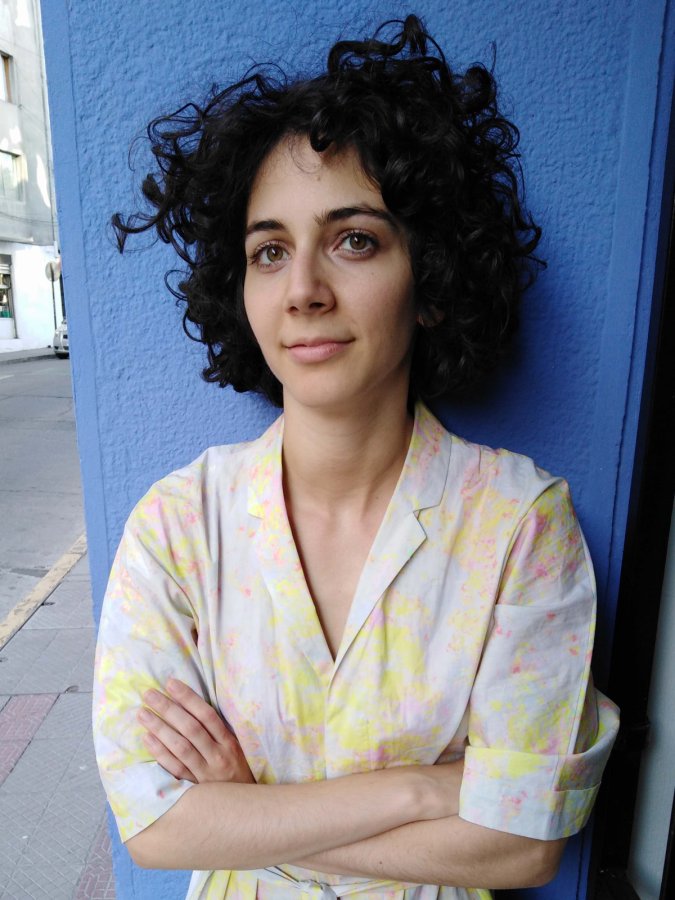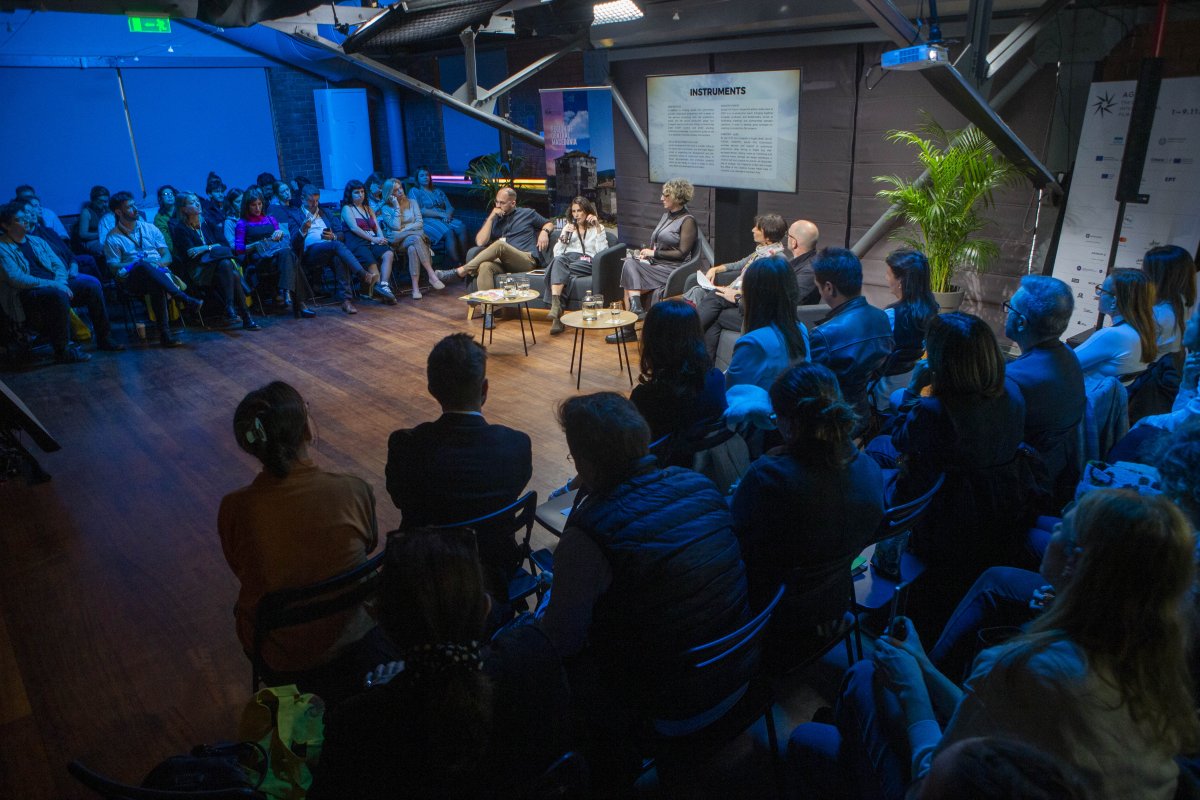The beloved director Nikos Perakis received the Golden Alexander Award of the Thessaloniki Film Festival from the hands of the great German filmmaker Volker Schlöndorff, at a special event held on Tuesday evening, November 7th, at Olympion theater. The honorary event was followed by the screening of the film Living Dangerously in universal accessible terms, with the support of Alpha Bank, accessibility sponsor of the Festival, within the framework of the 64th Thessaloniki Film Festival's tribute to the work of Nikos Perakis both as a director and as a production designer.
The event was introduced by the Festival's artistic director, Orestis Andreadakis, who welcomed the audience and expressed his gratitude to both Alpha Bank and the artists with disabilities for their invaluable contribution to making the Festival more accessible to the public, without any exceptions or restrictions. "We are especially glad that we chose a universally accessible screening to honor the man who changed modern Greek comedy," Orestis Andreadakis initially stated. He then went on to present Nikos Perakis and the great German filmmaker Volker Schlöndorff, a long-standing collaborator of his, who would bestow the Golden Alexander on the Greek filmmaker. "Since the 1980s and with iconic films such as Arpa Colla, Loafing and Camouflage, and the one we’ll be seeing today, Living Dangerously, Nikos Perakis has relentlessly expressed biting criticism on the contemporary Greek reality. Prior to that, however, he already had a significant body of work as a production designer, having worked on some of the most emblematic films of German cinema. One of these was Volker Schlöndorff’s The Tin Drum, Foreign Language Academy Award and Palme D’ Or winning film, which is being screened at this year's Festival. Thus, we are thrilled to welcome the director of this legendary film, one of the most important filmmakers of world cinema, Volker Schlöndorff, to Thessaloniki," Orestis Andreadakis noted.
"Thank you, all you wonderful people out there in the dark", Volker Schlöndorff said, addressing the audience with a reference to Billy Wilder's Sunset Boulevard. The German filmmaker then spoke about the work of Nikos Perakis, recalling their first meeting in 1972, when he and his wife, Margarethe von Trotta, were working on the film A Free Woman. In that film, Nikos Perakis was in charge of production design. "We didn't know at the time that Nikos Perakis wanted to be a director. He was part of our small community, calling itself New German Cinema, in the south of Bavaria, in Munich, living under the same roof as other key figures and collaborating with new directors. He was considered one of us and not a Greek, something that was bound to change in time. At some point, he eventually told us that during the breaks in between the films he was making in Germany, he would go to Greece and shoot films we'd never seen. He continued to create films in the German language with German actors, such as Bomber & Paganini with Mario Adorf, and he undertook production design on my own film, The Lost Honor of Katharina Blum, but because the casting and the filming took a long time to begin, he decided to return to Greece and direct his first feature film. The plans he had managed to prepare for the production of my own film were a real revelation," emphasized Volker Schlöndorff.
The German filmmaker proceeded to praise Nikos Perakis' contribution to cinema, highlighting his pioneering technique in production design and his impact on his own work. "In the film, the action takes place almost exclusively in a police station, an aspect that - in Germany, in the 1970s, and still even today, to be honest - risks becoming particularly boring," he continued, speaking of The Lost Honor of Katharina Blum. "However, the set design introduced the following innovation: some walls that initially divided a cabin were movable, gradually opening along the course of the film to gradually include the rest of the cast, transforming the setting. It is of course a technique that many filmmakers have followed since then, an innovation for which Nikos Perakis has not been credited the way he should have been, for this great contribution to world cinema," said Volker Schlöndorff, drawing parallels with the influential work of other famous film set designers, such as Ken Adams in Stanley Kubrick's Dr. Strangelove.
"I couldn't think of a better way to recreate the nightmarish universe of World War II in The Tin Drum than as a dark game, and that's exactly what Nikos's vision was. In Voyager, arguably my personal favorite in my filmography, a large portion of which was shot in Greece, Nikos worked wonders: he reconstructed a plane that no longer existed with the help of American pilots and landed it in the desert, creating one of the most spectacular scenes I've ever had in a film. I thank him deeply for that," he added.
Just before the German director presented the Golden Alexander to Nikos Perakis, he referred to the virtues of his work as well as his remarkable career. "Nikos Perakis brought humor, intelligence and sophisticated aesthetics to German cinema, while in Greek cinema he highlighted political responsibility within the social context through satire, which is also the point of the film we are going to see today. It is for all these reasons that we are honoring him today with the Golden Alexander." Volker Schlöndorff then invited Nikos Perakis to the stage to receive his award. He said with enthusiasm, "Thank you, I am overjoyed to receive this award today. I thank the Festival, all the administrative, organizational, and artistic staff who thought of me, the city that hosted me, Alexandria where I was born, dozens of benefactors, friends, teachers who taught me their arts - that's where I learned, I didn't attend film school. I thank all of you who are here today," he concluded.
The awarding of Nikos Perakis was followed by the screening of the film Living Dangerously.
Living Dangerously is one of the most sharp and imaginative works in Greek cinema, criticizing the timeless and unforgiving pathologies of Greek society. The plot unfolds as follows: on the morning of the World Cup final, Karamanos, an employee of the Hellenic Telecommunications Organization (TOE), connects his commander's personal computer to an evil, complex and explosive device. He threatens to detonate the floor and the satellite dishes above, if he is not allowed to appear on the national network 10 minutes before the football match to denounce all the wrongs that plague the life of the Greek citizen and make him a victim of a partisan and corrupt state.
At the end of the screening, a Q&A and a discussion followed with the audience. In response to a question regarding his insight and the "prophetic" storyline of the film, Nikos Perakis explained that he had drawn inspiration from his time working at OTE (Hellenic Telecommunications Organization), as well as from the period of the Greek junta. As for his collaborators, fellow directors, producers, who appear in the film, such as Fotos Lambrinos, Pantelis Voulgaris, Yorgos Tsemberopoulos and Diagoras Chronopoulos, he warmly expressed, "I could never have imagined that I would find better actors and collaborators."
As part of the Q&A, director Yorgos Tsemberopoulos discussed the component of social sensitivity and denunciation in the cinema of Nikos Perakis, while the comedian and presenter of this year's opening ceremony of the Festival, Dimitris Piatas, emphasized the underlying documentary connotation in Living Dangerously, the presence of many beloved faces in front of the camera associated with the personality of the filmmaker himself, as well as his unsurpassed satirical humor. In the words of Nikos Perakis, "the characters have been in the works since Loafing and Camouflage. The names are the same, some actors were just changed simply because they needed to appear older, whereas others continued to exist," he also stressed that each character is differentiated from the others by having distinctive characteristics.
In the framework of the Festival, the Laboratory for the Study of Greek Cinema & Television (LSGCT) at the School of Film of the Aristotle University of Thessaloniki, with the support of the Festival, will present a colloquium focusing on the work of Nikos Perakis on Thursday, November 9th, at Pavlos Zannas theatre. Speakers: Eleftheria Thanouli Professor at AUTH, Director of LSGCT, President of TIFF; Panayis Panayiotopoulos Associate Professor, NKUA; Stathis Kalyvas Professor, Oxford University; Betty Kaklamanidou Associate Professor, AUTH; Anastasia Tintikaki, Undergraduate Student; Professor, University of Sydney; Vassilis Vamvakas, Associate Professor, AUTH. The colloquium will conclude with a discussion with the important director, moderated by Eleftheria Thanouli and Stathis Kalyvas.
















